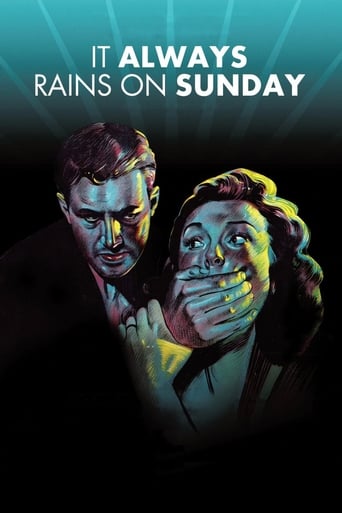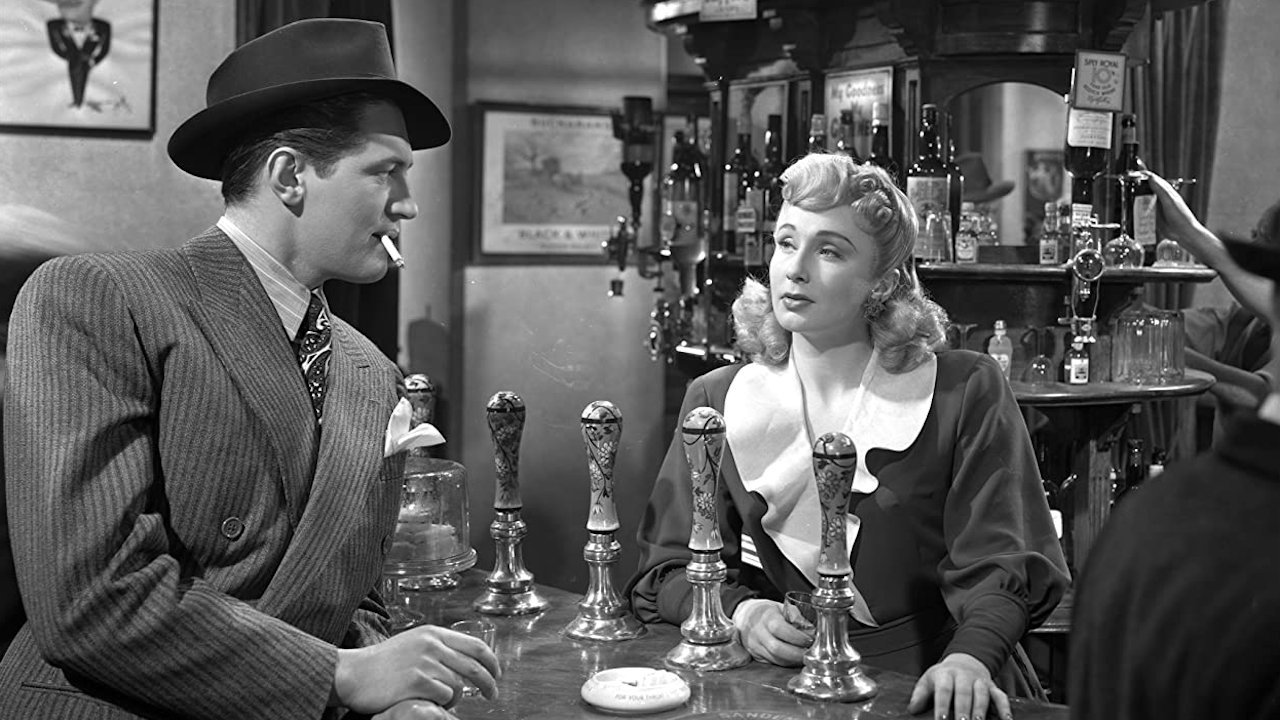Martin Bradley
This fairly realistic and exciting post-war British picture is a model example of its kind. It's well-written, well-directed, (by Robert Hamer), and very well acted by a cast of British stalwarts and in many ways it prefigures the kitchen-sink movies of the late fifties and early sixties. John McCallum is the escaped convict who hides out in the home of former girlfriend Googie Withers who is now married to older Edward Chapman and is stepmother to his problematic family, (in real-life McCallum and Withers were married for 62 years).If its mix of location work and studio sets lets it down slightly it's nevertheless a very good picture of a tightly-knit East End community and was remarkably grown-up for its period. It also manages to keep several related plots on the boil at the same time without feeling over-egged. Maybe not quite the classic some people claim of it but outstanding all the same.
Red-125
It Always Rains on Sunday (1947), co-written and directed by Robert Hamer, is a film noir movie set in London's working class East End. The film is dated in many ways--London, two years after the end of WW II, is not the London that we know in the 21st Century. We can still see evidence of bomb damage, rationing still applies, and there's a sense of community where everyone knows everyone else's business. Police and petty criminals engage in banter: Joe runs a lunch wagon where criminals tend to meet. A detective sergeant stops at the wagon for information. Joe: We don't cater to the criminal classes. Detective Sergeant Fothergill: Turned over a new leaf?Several plot lines run through the film. An escaped convict--scarred after being flogged with a cat-o-nine-tails--turns up at the home of a woman he once loved, and who loved him. Rose Sandigate, played by the talented and beautiful Googie Withers, has since entered into a practical marriage with a man 15 years older than she is. We enter into her life, along with the lives of her two step-daughters, her son, three petty criminals trying to get rid of stolen roller skates, and some Jewish good guys, bad guys, and not-so-bad guys.The production values aren't great, and the lower class accents sometimes call for subtitles. Nevertheless, the central plot element of an escaped convict, who returns to find that the woman he loves has married while he was in jail, is as compelling now as it was 60 years ago.Finally, the powerful scene of detectives chasing a man through the train yards in the dark, was surely known to Carol Reed when he directed "The Third Man." Reed's scene, set in the sewers of Vienna, took place miles away from Hamer's London. Even so, in compelling action and suspense, they have a great deal in common.
ianlouisiana
This is one of those "slice of cockney life" films so beloved of post war British filmmakers.It belongs in a time capsule along with "Picturegoer","Illustrated","Lilliput" and "Health and efficiency". It's so wonderfully silly and full of British thesps struggling bravely with their dipthongs and glottal stops. I don't think anybody actually says"Blimey guv'nor,yore a toff and no mistyke" but that was probably due to an oversight.However,there is some slight connection with real life in the 1940s that overrides these criticisms and makes it quite compelling in its absurd way.60 years ago London comprised of dozens of autonomous communities like the one shown in this film.They were separated by clearly defined social and physical boundaries.If a boy from Bethnal Green was walking out with a girl from Poplar,say,she would have been viewed with some suspicion by his friends and family. Together with Stepney,Bethnal Green,Poplar and Bow have merged into The Borough of Tower Hamlets.Half a century of Town Planning and Social Engineering has seen the community become ghettoised and divided along racial and religious lines that not even the most pessimistic East Ender could have foreseen.So in these black and white images we have a portrait of a society that - all unknowing - was on its way to extinction. The major problem I have with "It always rains on Sunday" is the casting of Miss G.Withers and Mr J.Macallum in the lead roles.I'm not sure what they're speaking but it certainly isn't cockney.Edith Evans as Lady Bracknell comes to mind. Jack Warner,Sidney Tafler and the great Meier Tzelnicker walk away with the film,masters all of what is now called "Estuary English". When you look at this and "The Blue Lamp" you are seeing the first stirrings of British Noir Cinema if I may use so grand a term.As such,both films have been hugely influential on subsequent generations of artists and countless TV soaps. Every film of course is a Time Machine,and here,preserved,is a Britain on the verge of the Welfare State,populated by people many of whom were still suffering from the deprivations of the Second World War,a male - dominated society where a considerable amount of the community had outside lavatories and no bathrooms,everybody smoked and the local copper could give you a clip round the ear without being thought a fascist brute because everybody knew what real fascists were. If you remember this era with some affection - however grudging - the chances are you already know "It always rains on Sunday". If it seems like a recounting of some Dark Age then you might find as L.P. Hartley said,that the past is a foreign country,and whilst it might be worth your while to take your passport and visit,you wouldn't want to live there.
Marc-18
This film portrays the post-war East End atmosphere like few other films. Its characters appear to be typical East End characters - the frustrated housewife, adventurous schoolboy, local spiv, small-time gangsters, Jack Warner as the archetypical detective, patrician father-figure - just a few of the memorable characters whose lives intertwine on a bleak, rainy Sunday afternoon in London. There is more to these characters than meets the eye, as the plot unravels.A note on the music: a cheery theme that is repeated throughout the film, as the setting returns to the Sandigates' terraced house, apparently called "Theme without Words": as so often with Ealing films, it adds to the setting a very fitting background.


 AD
AD





